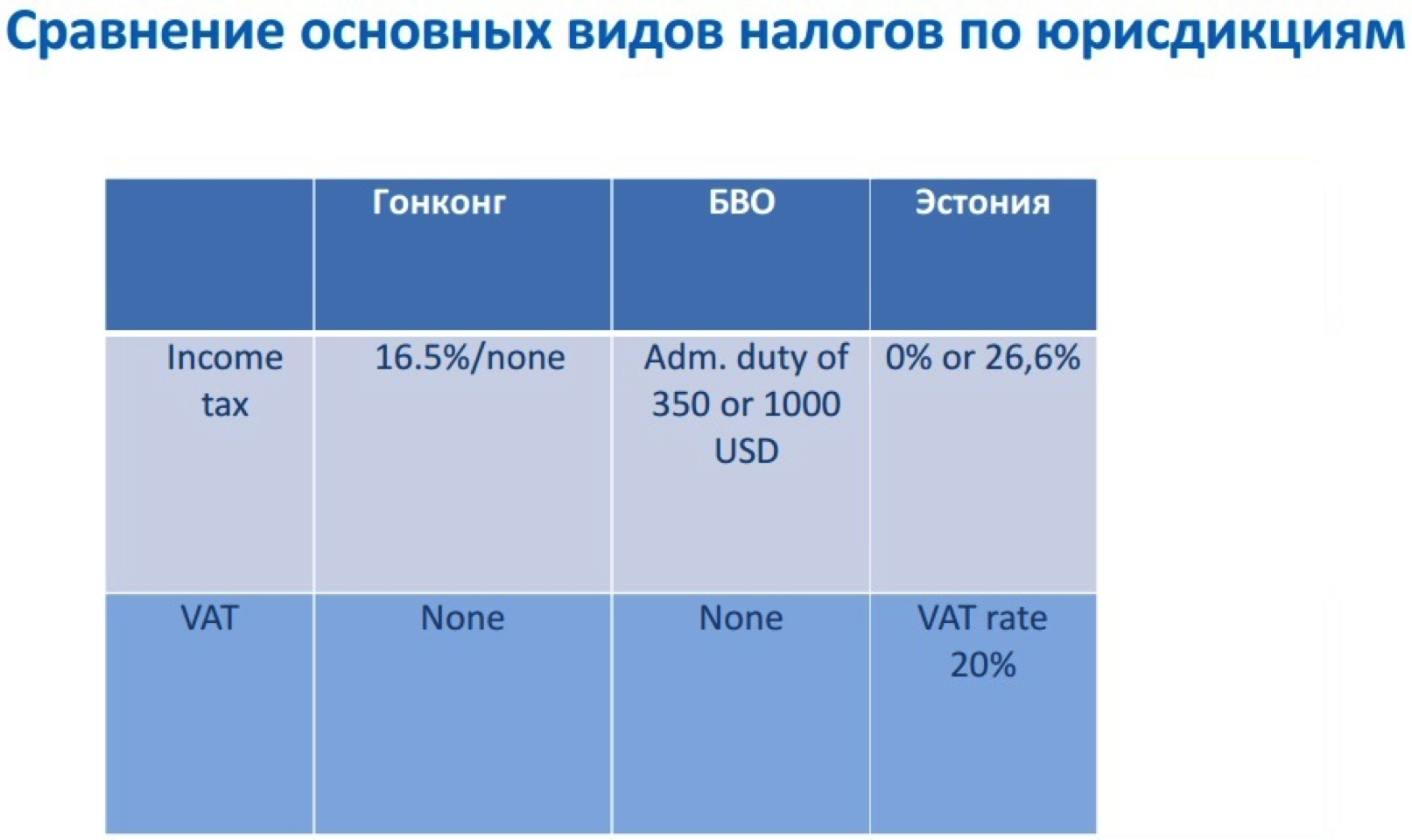Company in BVI, in Estonia and Hong Kong - pros and cons
There are always advantages and disadvantages to creating a legal entity. The founder of the Polyglot project, Andrei Prudko, wrote about the pros and cons of registering in the BVI, in Estonia and Hong Kong, and why they started to look for new ways to fully conduct business.

First of all, briefly about the factors that influenced our choice for exit. The focus of our project is to simplify the search for freelance translators, tutors, copywriters and guides working in any geographic location (international platform). To make it clear that users of the service sell and buy services in the language sphere, the Polyglot project is carried out through the website, the Customer can use the services on the website only once. But for this ... Under Ukrainian law, in order to accept money from non-residents, our service is obliged to conclude an agreement with each foreign user and exchange documents with him within 90 days. In addition, income tax is 18%. NBU changes restrictions on foreign exchange transactions ( read more) Since, as already mentioned, our service is international, similar features of Ukrainian legislation forced us to look for other ways of conducting settlements and withdrawing funds. Our company commissioned a study, it was done by professional lawyers, we share some of this information here.

So, what opportunities can an entrepreneur gain by registering a legal entity abroad?
Create or not jur. person abroad?
Positive points
• There are countries where the laws themselves are, in the first place, much more favorable for doing business:
• The climate for finding and attracting investments is more favorable;
• An opportunity is available to search for new customers, entering new markets;
• The possibilities for managing the currency, for example, are wider, for the parties to the contract more freedom in regulating relations. There are fair competition laws and laws prohibiting customer lure;
• There are tax preferences;
• The judicial system is more effective;
• For some businesses, a positive point may be the lack of direct simplified access to information about the company’s activities for tax and law enforcement agencies.
Negative points
• Keep documentation and communicate in a non-native language;
• It is necessary to find and attract an accountant, a sufficiently good level of competence in local legislation;
• There may be additional costs for opening an account with a foreign bank (you may have to be present in person);
• Because If you are not a resident, there may be difficulties in lending to foreign banks.
In choosing a country for registration of a legal entity, everyone will be guided by their needs, based on individual characteristics. Our business needs have narrowed our choices to the British Virgin Islands (BVI), Estonia and Hong Kong.
British Virgin Islands

A standard offshore company, created, including in the BVI, is quite suitable if you are not going to use it for operational purposes in the US and European markets. The most commonly used constituent forms for BVI are as follows:
- Limited liability company (BVI private company limited by shares);
- A company with the liability of participants limited by guarantee (BVI private company limited by guarantee);
- Joint Stock Company (BVI Public Company).
An offshore company is needed as a tool for tax planning, and in the future, for doing business in Europe, you can register a company in another, more “respected” jurisdiction.
Positive aspects (BVI)
• To create a company you need only one director (individual or legal entity) and there is no need for a secretary;
• Share capital - minimum paid $ 1, standard announced $ 50,000;
• Depending on whether or not the statutory fund exceeds $ 50,000, the annual state fee will be $ 350 or $ 1,100;
• The official language is English, the currency is USD, the legal system is Anglo-Saxon;
• There is no need to confirm the company's activities with financial statements; there is no currency control;
• Capital gain or transfer, sale of property, inheritance - are not taxed, there is no VAT. Tax and state. duties are only for real estate;
• The confidentiality level of recipients of cash payments is high. Information about the beneficiaries can only be obtained by court order.
Negative moments (BVI)
• BVI reputation - offshore for the black business. As a result, the level of trust among reputable customers is low;
• It will be prohibited for you to provide services to BVI residents;
• Although financial reporting is optional, audits may and will sometimes need to be provided;
• Because your company will be offshore, there will be no opportunity to own real estate in the BVI.
Estonia

The Baltic countries and Estonia in particular have recently been popular among IT businesses. Startup culture here is at a high level, which causes great interest and attention to the local market from investors. The IT infrastructure in this territory is also one of the most developed in the European Union. Legal forms for companies, Estonian law provides for two:
- Limited liability company;
- Joint-Stock Company.
It should also be noted that monitoring the state of the company will be easier, due to its close geographical location to the CIS countries.
Positive aspects (Estonia)
• Estonia is a member of the EU and the Eurozone, therefore, it has unlimited access to the common market of member countries;
• The local population knows English well, and often also Russian;
• In order to open an account with an Estonian bank, it is not necessary to be there territorially;
• Resident companies of the country have unlimited opportunities for opening accounts with foreign banks, and can conduct transactions in any currency;
• There is no currency control;
• The tax system here is quite loyal. If you decide to reinvest the profit, then you will be exempted from the obligation to pay income tax;
• An effective contractual system avoids double taxation: at a rate of 6%, non-resident external income is exempted from repatriation tax;
• The submission of all accounting and tax reporting in Estonia is carried out electronically;
• Real estate is not taxed;
• Long-term visas are issued to owners and heads of Estonian companies, and, if desired, citizenship will be simplified.
Negative points (Estonia)
• In matters of the ownership structure of the company, confidentiality is low;
• The minimum authorized capital established for the LLC is € 2500. Its payment can be postponed until the event specified in the law (for example, until the capital decreases or increases, until dividends are paid). However, sooner or later it will still have to be done;
• High tax jurisdiction, corporate tax rate is quite high (almost 26.6%). But, only distributed profits are taxed. In this case, the distribution of capital are: expenses and payments, payment of dividends, reduction of the authorized capital;
• You will be required to provide financial statements annually.
Hong Kong

This state is a member of APEC (APEC - Asia-Pacific Economic Cooperation), also, not only in Asia but also in the world, Hong Kong is considered one of the largest centers of business and trade. The proximity of Hong Kong to such large markets of Southeast Asia as Thailand, Malaysia, Indonesia, is very favorable for developing business relations. Well, the close proximity to China provides access to its huge market and promotes very effective communications in business.
In Hong Kong, the most common form of enterprise is a limited company.
Positive aspects (Hong Kong)
• Actions necessary for registering a company in Hong Kong can be carried out remotely, you can personally not be present;
• Two official languages - Chinese and English, Anglo-Saxon legal system;
• For authorized capital, there are no restrictions on the types of currencies and the amount of the contribution;
• Sufficiently soft business conditions - the income tax rate is very low (16.5%), no VAT;
• The legislative climate is favorable for foreign investors. To be the owner of a company, it is not necessary to be a resident (except for cases when the company belongs to certain strategic sectors);
• Income generated in this administrative region will not be taxed if its source, as well as business activities, is geographically outside Hong Kong;
• If your Hong Kong company has a registered capital of not more than 10,000 Hong Kong dollars (about $ 1300), then the minimum state license fee will be about $ 300. In general, such a fee depends on the size of the authorized capital and is paid by the company annually;
• It is not necessary to assemble directors and shareholders of a Hong Kong company every year. And such meetings can be held where convenient, anywhere in the world;
• Because in mergers and acquisitions, antitrust and other restrictions are absent, then you can easily exit the business.
Negative moments (Hong Kong)
• Remotely, you cannot open a bank account;
• Mandatory presence of a corporate secretary - a resident of Hong Kong (individual or legal entity);
• Bookkeeping and annual audits are mandatory for Hong Kong companies. At the same time, auditors have serious requirements - all necessary primary accounting documents (orders, invoices, contracts, etc.) must be available;
• For tax planning, the absence of a Double Taxation Avoidance Agreement with some countries, in particular with Ukraine and Russia, may be disadvantageous;
• In the register of companies, information on shareholders and directors is publicly available (except for nominee services).
And in conclusion - short conclusions.
As can be seen from the information provided, in each of the jurisdictions discussed above, there are both positive and negative points.


In hong kongDespite the favorable investment climate, lack of VAT and pleasantly low corporate income tax rates, there is a strict approach to reporting and auditing. To open a bank account, you have to attend in person.
In Estonia , you can easily open a corporate account in one of the easiest and most popular ways - remotely. This convenience is important if we take the Google Play policy as an example (the bank account of the company must be in the same country with it). Also, a positive point is the well-developed electronic reporting in Estonia.
In BVI, for your company there will be no annual fixed payment (tax rate) and mandatory financial statements. But there may be some distrust on the part of some customers due to the reputation of this jurisdiction.

First of all, briefly about the factors that influenced our choice for exit. The focus of our project is to simplify the search for freelance translators, tutors, copywriters and guides working in any geographic location (international platform). To make it clear that users of the service sell and buy services in the language sphere, the Polyglot project is carried out through the website, the Customer can use the services on the website only once. But for this ... Under Ukrainian law, in order to accept money from non-residents, our service is obliged to conclude an agreement with each foreign user and exchange documents with him within 90 days. In addition, income tax is 18%. NBU changes restrictions on foreign exchange transactions ( read more) Since, as already mentioned, our service is international, similar features of Ukrainian legislation forced us to look for other ways of conducting settlements and withdrawing funds. Our company commissioned a study, it was done by professional lawyers, we share some of this information here.

So, what opportunities can an entrepreneur gain by registering a legal entity abroad?
Create or not jur. person abroad?
Positive points
• There are countries where the laws themselves are, in the first place, much more favorable for doing business:
• The climate for finding and attracting investments is more favorable;
• An opportunity is available to search for new customers, entering new markets;
• The possibilities for managing the currency, for example, are wider, for the parties to the contract more freedom in regulating relations. There are fair competition laws and laws prohibiting customer lure;
• There are tax preferences;
• The judicial system is more effective;
• For some businesses, a positive point may be the lack of direct simplified access to information about the company’s activities for tax and law enforcement agencies.
Negative points
• Keep documentation and communicate in a non-native language;
• It is necessary to find and attract an accountant, a sufficiently good level of competence in local legislation;
• There may be additional costs for opening an account with a foreign bank (you may have to be present in person);
• Because If you are not a resident, there may be difficulties in lending to foreign banks.
In choosing a country for registration of a legal entity, everyone will be guided by their needs, based on individual characteristics. Our business needs have narrowed our choices to the British Virgin Islands (BVI), Estonia and Hong Kong.
British Virgin Islands

A standard offshore company, created, including in the BVI, is quite suitable if you are not going to use it for operational purposes in the US and European markets. The most commonly used constituent forms for BVI are as follows:
- Limited liability company (BVI private company limited by shares);
- A company with the liability of participants limited by guarantee (BVI private company limited by guarantee);
- Joint Stock Company (BVI Public Company).
An offshore company is needed as a tool for tax planning, and in the future, for doing business in Europe, you can register a company in another, more “respected” jurisdiction.
Positive aspects (BVI)
• To create a company you need only one director (individual or legal entity) and there is no need for a secretary;
• Share capital - minimum paid $ 1, standard announced $ 50,000;
• Depending on whether or not the statutory fund exceeds $ 50,000, the annual state fee will be $ 350 or $ 1,100;
• The official language is English, the currency is USD, the legal system is Anglo-Saxon;
• There is no need to confirm the company's activities with financial statements; there is no currency control;
• Capital gain or transfer, sale of property, inheritance - are not taxed, there is no VAT. Tax and state. duties are only for real estate;
• The confidentiality level of recipients of cash payments is high. Information about the beneficiaries can only be obtained by court order.
Negative moments (BVI)
• BVI reputation - offshore for the black business. As a result, the level of trust among reputable customers is low;
• It will be prohibited for you to provide services to BVI residents;
• Although financial reporting is optional, audits may and will sometimes need to be provided;
• Because your company will be offshore, there will be no opportunity to own real estate in the BVI.
Estonia

The Baltic countries and Estonia in particular have recently been popular among IT businesses. Startup culture here is at a high level, which causes great interest and attention to the local market from investors. The IT infrastructure in this territory is also one of the most developed in the European Union. Legal forms for companies, Estonian law provides for two:
- Limited liability company;
- Joint-Stock Company.
It should also be noted that monitoring the state of the company will be easier, due to its close geographical location to the CIS countries.
Positive aspects (Estonia)
• Estonia is a member of the EU and the Eurozone, therefore, it has unlimited access to the common market of member countries;
• The local population knows English well, and often also Russian;
• In order to open an account with an Estonian bank, it is not necessary to be there territorially;
• Resident companies of the country have unlimited opportunities for opening accounts with foreign banks, and can conduct transactions in any currency;
• There is no currency control;
• The tax system here is quite loyal. If you decide to reinvest the profit, then you will be exempted from the obligation to pay income tax;
• An effective contractual system avoids double taxation: at a rate of 6%, non-resident external income is exempted from repatriation tax;
• The submission of all accounting and tax reporting in Estonia is carried out electronically;
• Real estate is not taxed;
• Long-term visas are issued to owners and heads of Estonian companies, and, if desired, citizenship will be simplified.
Negative points (Estonia)
• In matters of the ownership structure of the company, confidentiality is low;
• The minimum authorized capital established for the LLC is € 2500. Its payment can be postponed until the event specified in the law (for example, until the capital decreases or increases, until dividends are paid). However, sooner or later it will still have to be done;
• High tax jurisdiction, corporate tax rate is quite high (almost 26.6%). But, only distributed profits are taxed. In this case, the distribution of capital are: expenses and payments, payment of dividends, reduction of the authorized capital;
• You will be required to provide financial statements annually.
Hong Kong

This state is a member of APEC (APEC - Asia-Pacific Economic Cooperation), also, not only in Asia but also in the world, Hong Kong is considered one of the largest centers of business and trade. The proximity of Hong Kong to such large markets of Southeast Asia as Thailand, Malaysia, Indonesia, is very favorable for developing business relations. Well, the close proximity to China provides access to its huge market and promotes very effective communications in business.
In Hong Kong, the most common form of enterprise is a limited company.
Positive aspects (Hong Kong)
• Actions necessary for registering a company in Hong Kong can be carried out remotely, you can personally not be present;
• Two official languages - Chinese and English, Anglo-Saxon legal system;
• For authorized capital, there are no restrictions on the types of currencies and the amount of the contribution;
• Sufficiently soft business conditions - the income tax rate is very low (16.5%), no VAT;
• The legislative climate is favorable for foreign investors. To be the owner of a company, it is not necessary to be a resident (except for cases when the company belongs to certain strategic sectors);
• Income generated in this administrative region will not be taxed if its source, as well as business activities, is geographically outside Hong Kong;
• If your Hong Kong company has a registered capital of not more than 10,000 Hong Kong dollars (about $ 1300), then the minimum state license fee will be about $ 300. In general, such a fee depends on the size of the authorized capital and is paid by the company annually;
• It is not necessary to assemble directors and shareholders of a Hong Kong company every year. And such meetings can be held where convenient, anywhere in the world;
• Because in mergers and acquisitions, antitrust and other restrictions are absent, then you can easily exit the business.
Negative moments (Hong Kong)
• Remotely, you cannot open a bank account;
• Mandatory presence of a corporate secretary - a resident of Hong Kong (individual or legal entity);
• Bookkeeping and annual audits are mandatory for Hong Kong companies. At the same time, auditors have serious requirements - all necessary primary accounting documents (orders, invoices, contracts, etc.) must be available;
• For tax planning, the absence of a Double Taxation Avoidance Agreement with some countries, in particular with Ukraine and Russia, may be disadvantageous;
• In the register of companies, information on shareholders and directors is publicly available (except for nominee services).
And in conclusion - short conclusions.
As can be seen from the information provided, in each of the jurisdictions discussed above, there are both positive and negative points.


In hong kongDespite the favorable investment climate, lack of VAT and pleasantly low corporate income tax rates, there is a strict approach to reporting and auditing. To open a bank account, you have to attend in person.
In Estonia , you can easily open a corporate account in one of the easiest and most popular ways - remotely. This convenience is important if we take the Google Play policy as an example (the bank account of the company must be in the same country with it). Also, a positive point is the well-developed electronic reporting in Estonia.
In BVI, for your company there will be no annual fixed payment (tax rate) and mandatory financial statements. But there may be some distrust on the part of some customers due to the reputation of this jurisdiction.
